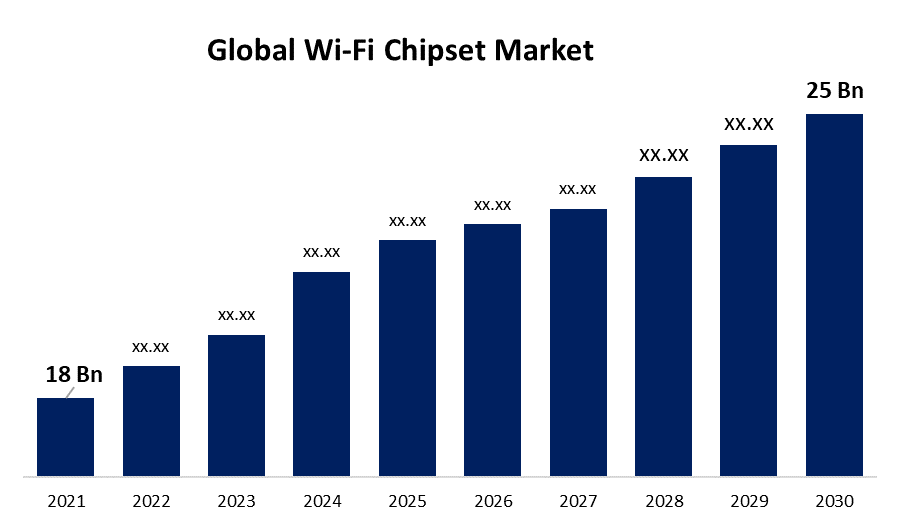Global Wi-Fi Chipset Market Size, Share, and COVID-19 Impact Analysis, By Product (Smartphones, Tablet, PCS Access Points, Others), By Band (Single Band, Dual Band, TRI Band), by Region (North America, Europe, Asia-Pacific, Latin America, Middle East, and Africa), Analysis and Forecast 2021 – 2030
Industry: Electronics, ICT & Media
Global Wi-Fi Chipset Market Insights Forecasts to 2030
- The global Wi-Fi Chipset market was valued at USD 18 billion in 2021.
- The market is growing at a CAGR of 4% from 2022 to 2030
- The global Wi-Fi Chipset market is expected to reach USD 25 billion by 2030
- The North America is expected to grow the fastest during the forecast period

Get more details on this report -
The global Wi-Fi Chipset market is expected to reach USD 25 billion by 2030, at a CAGR of 4% during the forecast period 2022 to 2030. The market is expanding as a result of factors such as the rising demand for WIGIG wireless technology. A comprehensive analysis of the market is provided by the global Wi-Fi Chipset Market report.
Market Overview
In almost every business, Wi-Fi has supplanted traditional internet connectivity. Customers are mostly drawn to wireless connectivity because of the readily available, simple, and quick services made possible by technological improvements. The most popular consumer electronics technology today is Wi-Fi. Currently, there are numerous Wi-Fi connection points in every home and commercial structure. A laptop, smartphone, and smartwatch are a few examples of the two or more Wi-Fi-enabled gadgets that every customer has. As a result, every year the number of Wi-Fi connections that each access point must support increases. In order to connect such a vast number of devices with fast throughput, multiple Wi-Fi connections would need more channels and improved spectral efficiency. This aspect is anticipated to increase demand for Wi-Fi technologies supporting MU-MIMO and gigabit data transfer rates, such as 802.11ax, 802.11ay, and 802.11ac Wave 2, which operate over a 60GHz spectrum. A Wi-Fi semiconductor chipset is a piece of internal hardware created to permit communication between one wireless technology-capable device and another. Mobile phones, laptops, personal computers, and other wireless devices all contain this type of Wi-Fi semiconductor chipset. In addition to these gadgets, Wi-Fi semiconductor chipset also finds extensive use in a number of automation systems, including industrial and residential automation. There are various setups for the access points. The most affordable platform is the 1X1 arrangement, which is typically utilised in less complex gadgets like smartphones, tablets, and generic modems. High-end devices, however, choose a 2X2 or 4X4 layout since it allows for faster data transfer.
Global Wi-Fi Chipset Market Report Coverage
| Report Coverage | Details |
|---|---|
| Base Year: | 2020 |
| Market Size in 2020: | USD 18 Billion |
| Forecast Period: | 2022-2030 |
| Forecast Period CAGR 2022-2030 : | 4 % |
| 2030 Value Projection: | USD 25 Billion |
| Historical Data for: | 2019-2020 |
| No. of Pages: | 225 |
| Tables, Charts & Figures: | 120 |
| Segments covered: | By Product, By Band, By Region |
| Companies covered:: | Quantenna Communications Inc., STMicroelectronics N.V., BROADCOM, QUALCOMM, Intel Corporation, Samsung Electronics Co. Ltd., Peraso Technologies, Inc., Cypress Semiconductor Corporation, Marvell Technology Group Ltd. |
| Growth Drivers: | The market is expanding as a result of factors such as the rising demand for WIGIG wireless technology. |
| Pitfalls & Challenges: | The availability of cyber and security threats is one factor that is anticipated to restrain the growth of the Wi-Fi Chipset market. |
Get more details on this report -
Report Coverage
This research report categorizes the market for Wi-Fi Chipset based on various segments and regions and forecasts revenue growth and analyzes trends in each submarket. The report analyses the key growth drivers, opportunities, and challenges influencing the Wi-Fi Chipset market. Recent market developments and competitive strategies such as expansion, product launch and development, partnership, merger, and acquisition have been included to draw the competitive landscape in the market. The report strategically identifies and profiles the key market players and analyses their core competencies in each sub-segment of the Wi-Fi Chipset market.
Driving Factors
The market is expanding as a result of factors such as the rising demand for WIGIG wireless technology. A trade organisation known as the Wireless Gigabit Alliance (WiGig) was responsible for creating and promoting the use of multi-gigabit per second wireless communications technology that uses the unlicensed 60 GHz frequency spectrum. In 2013, the Wi-Fi Alliance absorbed the alliance. Several well-known technological companies are members of this alliance, including Cisco, Dell, Huawei Technologies, Intel, Apple, Microsoft, NEC, and NVIDIA. Compared to Wi-Fi, WiGig technology is more advanced in terms of speed and data transfer.
Restraining Factors
The availability of cyber and security threats is one factor that is anticipated to restrain the growth of the Wi-Fi Chipset market. Despite constant security issues and data breaches, the Wi-Fi chipset market continues to make sustained progress. The prevalence of sophisticated hacking techniques in the cyber network reduces the reliability of internet connectivity. Data leaks and hacking cases have been common despite security mechanisms like WEP and WPA. Wi-Fi connections provide hackers with an open doorway where they can gain access to sensitive data and incur significant damages.
Market Segmentation
- In 2021, Smartphones segment is dominating the market with the largest market share.
Based on type, the global Wi-Fi Chipset market is segmented into smartphones, tablets, PCS, Access Points, Others. Among these, smartphones segment is dominating the market with the largest market share. The market for smart gadgets is rising rapidly because to technological improvements and smartphones' low cost. Customers now find it simpler to use wireless applications thanks to the dominance of wireless technology in smartphones. Smartphones' chipsets offer connectivity, whether it is 2G/3G or Wi-Fi. Since tablets started to replace laptops, the digital market, which has always sought to improve, has seen a growth in the tablet market.
- In 2021, Single Band segment holds the largest market share over the forecast period.
On the basis of band, the global Wi-Fi Chipset market is segmented into single band, dual band, TRI band. Among these, single band segment holds the largest market share over the forecast period. The plug and play capabilities of the Single-band Wi-Fi chipset are very integrated. It is a Wireless LAN (WLAN) stack, supplicant, and TCP/IP stack embedded wireless subsystem with a tiny form factor. A powerful player in the Wi-Fi chipset market, dual-band Wi-Fi chipsets enable clients and routers to send and receive data over multiple bands simultaneously, enhancing both connection speed and quality. The only Wi-Fi alternatives accessible today are no longer limited to single and dual band chipsets. A tri-band Wi-Fi chipset with integrated multi-gigabit performance has been released. It balances residential coverage and information exchange while supporting a wide range of applications, from networking to I/O, at the same rates as cable access.
Regional Segment Analysis of the Wi-Fi Chipset Market
- North America (U.S., Canada, Mexico)
- Europe (Germany, France, U.K., Italy, Spain, Rest of Europe)
- Asia-Pacific (China, Japan, India, Rest of APAC)
- South America (Brazil and the Rest of South America)
- The Middle East and Africa (UAE, South Africa, Rest of MEA)

Get more details on this report -
Asia Pacific region is dominating the market with the market share of 41% during the forecast period.
Asia Pacific holds the largest market share of 41% and is anticipated to registers the overall growth of 4% over the upcoming years owing to the increasing efforts to support the allocation of new frequency band for next generation Wi-Fi in the region.
Recent Developments
- In December 2021, the Guam Singapore Connectivity Consortium have announced that it is going to provide high speed data assistance to research institutes in Asia.
Competitive Analysis:
The report offers the appropriate analysis of the key organizations/companies involved within the global Wi-Fi Chipset market along with a comparative evaluation primarily based on their product offering, business overviews, geographic presence, enterprise strategies, segment market share, and SWOT analysis. The report also provides an elaborative analysis focusing on the current news and developments of the companies, which includes product development, innovations, joint ventures, partnerships, mergers & acquisitions, strategic alliances, and others. This allows for the evaluation of the overall competition within the market.
List of Key Market Players
- Quantenna Communications Inc.
- STMicroelectronics N.V.
- BROADCOM
- QUALCOMM
- Intel Corporation
- Samsung Electronics Co. Ltd.
- Peraso Technologies, Inc.
- Cypress Semiconductor Corporation
- Marvell Technology Group Ltd.
Key Target Audience
- Market Players
- Investors
- End-users
- Government Authorities
- Consulting And Research Firm
- Venture capitalists
- Value-Added Resellers (VARs)
Market Segment
This study forecasts revenue at global, regional, and country levels from 2019 to 2030. Spherical Insights has segmented the global Wi-Fi Chipset market based on the below-mentioned segments:
Wi-Fi Chipset Market, By Product
- Smartphones
- Tablet
- PCS Access Points
- Others
Wi-Fi Chipset Market, By Band
- Single Band
- Dual Band
- TRI Band
Wi-Fi Chipset Market, Regional Analysis
- North America
- US
- Canada
- Mexico
- Europe
- Germany
- Uk
- France
- Italy
- Spain
- Russia
- Rest of Europe
- Asia Pacific
- China
- Japan
- India
- South Korea
- Australia
- Rest of Asia Pacific
- South America
- Brazil
- Argentina
- Rest of South America
- Middle East & Africa
- UAE
- Saudi Arabia
- Qatar
- South Africa
- Rest of Middle East & Africa
Need help to buy this report?